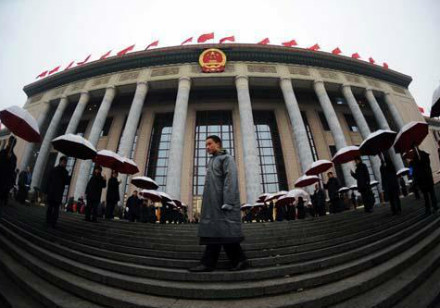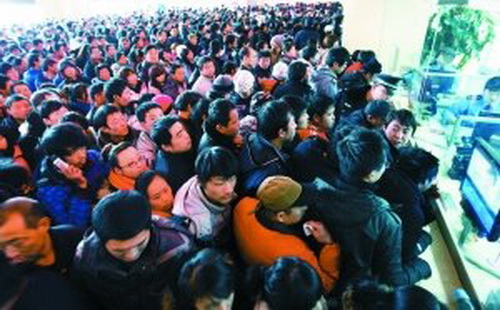January 25, 2013
By Pang Lei
Editors from the EO's Chinese website publish a daily collection of extracts from commentary pieces on topical issues that appear in the mainland press alongside reactions on Sina Weibo. Every Friday, the EO's English team translates a selection of these opinion pieces.

Disclosing the Assets of Officials
Background: The second meeting of the Chinese Communist Party's newly appointed Central Commission for Discipline Inspection (CCDI) ended on Jan 22. A report issued the next day said that the body planned to seriously implement a system that requires leaders in the party to declare their personal assets and also conduct spot checks. More details here.
Commentary:
Where's the best place to start when it comes to getting officials to declare their assets? According to the prevailing public mood and the lessons learned from various pilot programs conducted around the country, two good places to start are the opening up of details related to the property holdings of officials and getting all newly appointed officials to publicly declare their assets.
The Beijing News (新京报)
Original article: [Chinese]
The decision to properly enforce the system of getting top officials to declare their personal assets and to take the official declarations that have been submitted over these many years from the filing cabinet and shine a light on them, will help to reduce the obstacles that have stood in the way of the fight against corruption in China. This shows the resolve and wisdom of the new leadership's when it comes to fighting against corruption. It also lays the ground for the next step of requiring officials to declare all their assets publicly.
The Shanghai-based Oriental Morning Post (东方早报)
Original article: [Chinese]
The plan to have officials declare their assets publicly will require top-level planning. It will require an assets reporting law, that outlines in a systematic and detailed way the scope of the declarations, how they are to be completed, how they'll be investigated and who will assume legal responsibility. We must speed up the process of enacting laws to cover the declaration of officials' assets.
China Business View (华商报), a popular daily newspaper published in Xi'an.
Original article: [Chinese]
To promote a detailed system that covers the public declaration of personal assets officials is definitely going to be a gradual and painstaking process, the key is how to turn this "pressure" to open up into "action." If we can add a consideration of asset declaration to the system of promoting officials, make it clear that in some key positions the declaration of assets will be required and other similar measures, this will be a way of turning this pressure for openess into action.
The Guanzhou-baed Southern Metropolis Daily (南方都市报)
Original article: [Chinese]
The public declaration of officials' assets should not depend on the moral character of individual officials, it should instead be a systemic program that develops an iron rule. Only by not prevaricating or evading the issue and quickly setting up a system to cover the declaration of assets can be find the "tigers," only by doing this can we make a real mark. Whether we're really serious about fighting corruption or whether it's all empty words, to some extent can be determined by whether officials will be required to declare their assets.
The Shenzhen-based Jing Daily (晶报)
Original article: [Chinese]
Comments from Sina Weibo Users:
@人去楼空er:Yes, if an individual is willing to declare, than "the system" shouldn't get in the way! We should let a portion of those who are willing to declare lead the way. Not only will this serve as an example to others, it will also be a warning to those who are already corrupt or are on the verge of being corrupted!
Original post: [Chinese]
@HD郑三炮:How about we respect the willingness of individuals to take part by saying if you want to publicly declare your assets you can stay, if you're not willing to declare you can exit the public service.
Original post: [Chinese]

Putting Power in a Cage
Background: Xi Jinping, the General Secretary of the Chinese Communist Party, recently gave a speech to a meeting of the Central Commission for Discipline Inspection (CCDI). In that speech Xi emphasized the need to fight against corruption no matter if it involved a "tiger" (powerful official) or a "fly" (minor official). In the same speech, Xi Jinping noted the need to monitor and restrain the exercise of power and authority, to contain power in a cage. More details here.
Commentary:
Over recent years, the root cause of the growing prevalence of "roadside corruption" (i.e instances of corruption that are known to all) is that power is not restricted. Because of this, using the system to contain power in a cage is exactly what we need to do to encourage thrift and oppose waste.
The Beijing News (新京报)
Original article: [Chinese]
We need to rationally divide up the power that officials hold in their hands and establish a robust mechanism that can ensure that power is exercised in such a way that it is both coordinated and comes under mutual oversight. In this way we can be sure that the authority exercised by any one official can be effectively checked and balanced by another authority and guarantee that we have enough power to fine and punish any corrupt official.
The Oriental Morning Post (东方早报)
Original article: [Chinese]
One of the characteristics of power is that it is easily corrupted. One of the most effective solutions is to, as much as possible, make sure that authority is removed from areas where it doesn't need to be, this lessens the opportunities for power to be abused at its root.
The Beijing Times (京华时报)
Original article: [Chinese]
We can talk about fighting corruption until the cows come home, the key is to activate the Constitution, promote the Constitution and implement the Constitution. In theory, fighting corruption is simply about putting limits on power and monitoring authority. There are three road we can take, using power to limit power (权力制约权力), using democracy to limit power (民主制约权力) and using rights to limit power (权利制约权力). By following the constitution we can achieve all three of these things at the same time.
China Business View (华商报)
Original article: [Chinese]
If we take "closing power up in a cage," as a political goal, then "taking rights out of a cage" (把权利放出笼子), is one practical way of achieving this. Only by allowing citizens to monitor authority and through constant pressure being applied by high-level authority, is it likely that the universal challenge of corruption can really be overcome.
The Guanzhou-baed Southern Metropolis Daily (南方都市报)
Original article: [Chinese]
Comments from Sina Weibo Users:
@李开复:If we want to close power up in a cage, first we need to let the views and opinions that are locked up in the cage out.
Original post: [Chinese]
@任志强:When you know where the problems in a system are located, then you know the direction that reform should take. If you know that power needs to be contained within a cage, then you should limit the ability of power to interfere with the market, limit the ability of power to go beyonf the rule of law, limit the ability of power to seek rents, limit the ability of power to allocate resources, limit the ability of power to unfairly distribute wealth, limit the ability of power to interfere with freedom of speech and reestablish an effective system to limit power.
Original post: [Chinese]
@陈军--价值投资者:If there's not system of checks and balances, who is willing to lock themselves in a cage.
Original post: [Chinese]

Spring Festival Train Ticket Rush
Background: Controversy has surrouned the appearance of new plugins that are said by some to give tech-savvy individuals an advantage in the annual scramble for Spring Festival train tickets. The debate has also raised the issue of how train tickets are distributed and recently a lawyer has sought information from the Minisitry of Railways about how many train tickets are reserved for official use during the Spring Festival travel rush. More details here.
Commentary:
The more scarce a public resource is, the more important that it is distributed fairly, this is a more pressing and more practical question than how to make sure that rail capacity keeps up with demand. For a long time now, every Spring Festival people have complained about the rail system, aside from the difficulty of getting a ticket, people are even more frustrated by the fact that the ticketing system isn't fair, or at least isn't transparent enough. A convenient and fast ticketing channel will make people feel that fairness does indeed exist.
The Wuhan-based Changjiang Daily(长江日报)
Original article: [Chinese]
People can understand if there aren't enough tickets, but in order to be clear about the extent of the scarcity we need data. Has the introduction of online ticket sales come at the expense of those who line up to purchase a ticket? If this is the case, then the allocation of tickets definitely needs to be appropriately adjusted at both the policy-level and also in terms of technology.
The Chengdu-based Huaxi Metropolis Daily (华西都市报)
Original article: [Chinese]
According to freedom of information regulations, any government information that impacts on the interests of citizens or other organizations should be made public. The Ministry of Railways should reveal to the public a transparent ticket booking process.
Yanzhao Metropolis Daily (燕赵都市报)
Original article: [Chinese]
In the past we had tickets purchased via contacts in the system, now that tickets can be bought online, is it certain that is no longer the case? As long as a tickets are set aside, there is room for people to purchase tickets through their contacts. In order to prove their innocence, the Ministry of Railways should reveal information about these "set aside tickets".
Southern Metropolis Daily (南方都市报)
Original article: [Chinese]
In the final analysis, all these plugins have been forced into existence. The capacity of the rail system falls far short of the demand of travellers, when resources are scarce people try to "snatch" them. Of course, there should be rules about how we grab them, but no matter how the rules are set up, it will still all be about "snatching" tickets.
China Youth Daily (中国青年报)
Original article: [Chinese]
Although it's going to be hard to achieve in the short term, the basic fairness of "everyone being able to quickly and easily buy a ticket" should be based on an open and transparent ticketing procedure. By establishing a fair procedure we can protect the interests of disadvantaged social groups. Those with power should not be able to use hidden methods to game the system at the expense of others.
Jing Daily (晶报)
Original article: [Chinese]
Comments from Sina Weibo Users:
@lili-uk:Whether this situation is fair or not doesn't depend solely on the actions of individuals, in the final analysis, this is all about an imbalance between supply and demand. If there were enough train tickets for everyone, the a plugin that automatically refreshed a web page would not fundamentally change the nature of buying tickets. Through buying tickets online we're already taking advantage of the "digital divide," this has nothing to do with using a "ticket snatching" plugin.
Original post: [Chinese]
